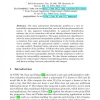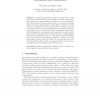17 search results - page 2 / 4 » An Identification Scheme Based on Sparse Polynomials |
ICASSP
2011
IEEE
12 years 8 months ago
2011
IEEE
In this paper, we propose an acceleration technique of the adaptive filtering scheme called adaptive proximal forward-backward splitting method. For accelerating the convergence ...
EUROCRYPT
2000
Springer
13 years 8 months ago
2000
Springer
Abstract. The noisy polynomial interpolation problem is a new intractability assumption introduced last year in oblivious polynomial evaluation. It also appeared independently in p...
BIOINFORMATICS
2006
13 years 4 months ago
2006
Motivation: Most previous approaches to model biochemical networks havefocusedeither on the characterization of a networkstructurewith a number of components or on the estimation ...
EUROCRYPT
2004
Springer
13 years 10 months ago
2004
Springer
Generating a distributed key, where a constant fraction of the players can reconstruct the key, is an essential component of many largescale distributed computing tasks such as ful...
TSP
2010
12 years 11 months ago
2010
Abstract--A cooperative approach to the sensing task of wireless cognitive radio (CR) networks is introduced based on a basis expansion model of the power spectral density (PSD) ma...


